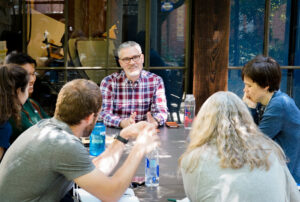Oral History Center Director’s Column
by Paul Burnett
It’s an honor and a privilege to address readers as the new director of the Oral History Center. I look forward to continuing the work I have been doing as interim director: helping to build new projects, increasing access to our collection, and facilitating the interpretive work that my colleagues do so well.
Students are back to school, and it is a time when everything can seem fresh for both our new and returning students. Although we experience this annual renewal with an incoming class and fresh faces, the academy is also a place of long, deep relationships, among colleagues, coworkers, and students. I interview people whose current friends can offer a window onto their activities and experiences over the past fifty, sixty years, all because they met here at Cal long ago. University is a place that connects people, and that ought to connect people.

In this month’s OHC newsletter, we see evidence of the deep connections people have with each other through institutions: government, foundations, and universities. My colleague Todd Holmes will be moderating an online panel discussion on October 18th with three influential women state senators who shaped and were shaped by the senate. Shanna Farrell and Amanda Tewes’ podcast explores local environmental activism through the history of the Save Mount Diablo Foundation, which was fueled by the long-term commitments and energy of the staff and the communities with which they worked. The new oral history of art historian and director of the Getty Research Institute Thomas Gaehtgens, also by Todd Holmes, is another example of decades-long dedication to institutions, disciplines, and practices.
Our student articles in this issue also explore the long-term relationships forged in efforts to change, or even survive, institutions. Intern Sari Morikawa explored the way in which individuals survived institutions such as the Japanese American incarceration camps. Shannon White explores the mutually supportive relationships of the suffragists, and the ways in which commitments to institutional change could take a toll on the personal obligations of activists. William Cooke marked the fiftieth anniversary of BART (Bay Area Rapid Transit) by exploring its origins and the ways in which this new institution transformed the relationships between local and regional governments.
Perhaps dedication, service, and long relationships are on my mind because of a passing of someone I met through the university. This person also talked about colleagues and students who became lifelong friends. We kept in touch over the years, and his passing reminds me of how wonderful it is to meet people from all over the world. The university, at its best, promises to be the departure lounge for a rich and rewarding life full of these connections and commitments.
About the Oral History Center
The UC Berkeley Oral History Center preserves voices of people from all walks of life, with varying political perspectives, national origins, and ethnic backgrounds. You can find all our oral histories from the search feature on our home page. Search by name, keyword, and several other criteria. We are committed to open access and our oral histories and interpretive materials are available online at no cost to scholars and the public.
Sign up for our monthly newsletter featuring think pieces, new releases, podcasts, Q&As, and everything oral history. Access the most recent articles from our home page or go straight to our blog home.